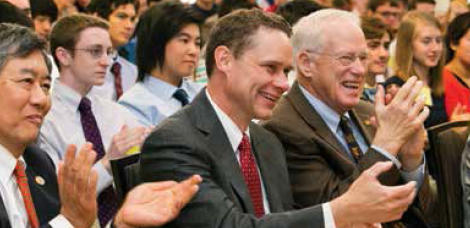BHEF focuses on evidenced-based practices and uses a rigorous methodology to strengthen our members' efforts to develop highly skilled, engaged professionals. These regional talent pathways create undergraduate programs that produce a diverse pool of enabled, workforce-ready graduates for today’s high-skill jobs.
BHEF's specific focus on undergraduate education is the result of extensive modeling. BHEF has pioneered the application of simulation modeling to better understand the U.S. education and workforce system, and this unique process allows us to build tools that will help meet the United States’ needs for graduates with robust skills in high demand fields. Learn more about BHEF's four simulation models.
Recent examples of strengthening talent initiatives:
Funded by the U.S. Navy Office of Naval Research, the Future Cyber Leaders Program brings together Washington D.C.-area defense sector companies and government agencies and select undergraduates from sponsoring defense sector organizations. To participate, students are nominated to join an exclusive cohort of peers in a seven-week program that provides cyber academic enrichment, leadership building, and networking opportunities. The first cohort of 30 students intern at BHEF-member companies Northrop Grumman Corporation, Parsons Corporation, and Raytheon Company. This leadership program supports interns by providing a summer of enriched, high-impact cyber experiences to complement their internships. Learn more.
Developing evidence-based approaches to higher education that meet business needs requires a thorough understanding of the desired skills and competencies. BHEF creates competency maps and uses labor analysis and employer input on talent needs to create knowledge and build new educational tracks that not only meet industry demand, but also widen opportunity for a more diverse field of students. This understanding informs the development of programs and curricula.

